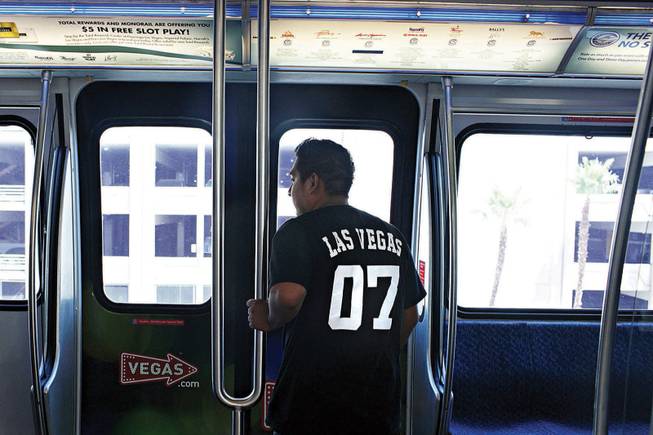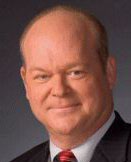
A passenger takes a trip on the Las Vegas Monorail on Monday. Ridership has failed to reach the optimistic projections made before the project was approved in 2000. Ticket sales cover the operation and maintenance of the monorail, but not the repayment of construction costs.
Tuesday, June 23, 2009 | 2 a.m.
Reader poll
Related Story
- Agency downgrades debts of Las Vegas monorail (6-22-2009)
Sun Archives
- Rail loses money, executives rake it in (3-18-2009)
- Bill introduced to make monorail salaries public (3-10-2009)
- Company gets extension to operate monorail (1-19-2009)
- Monorail to celebrate first birthday with little fanfare (7-15-05)
- Monorail needs major fixes (9-15-04)
- Monorail finally ready
- Monorail debut postponed again (3-2-04)
- LV looks at private monorail system (9-4-98)
Beyond the Sun
The Las Vegas Monorail was sold as a privately funded solution to traffic woes on the Strip — a transit line built without tax dollars.
Despite the promises of nine years ago, monorail officials now acknowledge they have quietly begun seeking public dollars in a bid to keep the financially troubled train running.
“We’re looking at all potential funding sources,” said Ingrid Reisman, a vice president of the Las Vegas Monorail. “We wouldn’t be doing our due diligence if we weren’t.
“Is there any determination what those solutions could be? No.”
Reisman said the monorail is looking at federal loans through the Transportation Infrastructure Finance and Innovation Act. Other sources with knowledge of the discussions said monorail officials are also looking at room tax money to help repay debt.
It’s a major shift for the project, which has fallen short of ridership and revenue estimates.
Monorail backers have fended off criticism by noting the 3.9-mile rail line, which runs from the MGM Grand to the Sahara, wasn’t a financial burden on the public. (Nearly every other public transit system in the country is funded with taxpayer dollars.)
To fund its construction the state issued tax-exempt bonds, which were purchased by private entities.
Reisman said the effort to seek public dollars is “a recognition that the system is definitely providing a service,” adding, “It is carrying a significant number of passengers, reducing vehicle miles. There is a significant air-quality benefit.”
“We’re also in a financial situation,” she said.
Bill Shranko, director of operations for the cab company Yellow Checker Star, which opposed the project from the beginning, said he isn’t surprised the monorail is looking for taxpayer help.
“We predicted this all along,” he said. “I’d be shocked if any government body goes one additional mile with the monorail.”
On July 1 the monorail will for the first time miss a biennial bond payment. That means control of the rail line could transfer to New York-based Ambac, the company that insured the construction bonds.
Fitch Ratings on Monday downgraded $450 million in bonds for the Las Vegas Monorail project to “C” from “CC,” which means the credit rating agency believes a default “appears imminent or inevitable.”
The project has $200 million in other debt, which can be repaid only after the $450 million “first tier” is repaid.
Monorail officials and board members said ticket receipts currently cover the cost of operation and maintenance, but not the repayment of construction costs. Because operations costs continue to be covered, monorail officials said it’s unlikely the rail line will shut down.
Bob Beers, a former state senator who was quietly appointed to the monorail’s board of directors by Gov. Jim Gibbons last month, said an outside restructuring officer was brought in at Ambac’s request to look at the organization.
“They’ve literally eliminated millions of dollars from expenses,” Beers said. As long as the monorail’s box office receipts cover expenses, he said, “they’d be nuts” to shut it down.
Lee Haney, executive vice president of Rogich Communications Group, which represents Ambac, said there are no immediate plans to shut down the rail line. Haney referred questions about possible taxpayer assistance to the monorail company.
There was intense debate over the monorail when it came before the Clark County Commission for approval in August 2000. (The Clark County Commission in December extended the monorail’s lease to 99 years.)
The project has failed to meet ambitious ridership projections used to sell it to public officials and investors. But critics, including Shranko, say there were warnings — including detailed studies — that showed ridership would never reach those levels.
“To be kind, it would be a misrepresentation,” Shranko said. “A complete and total misrepresentation for a project doomed to failure from the start.”
As it has struggled, officials have questioned its spending. After being threatened this year with legislation that would have made the company disclose compensation, the Las Vegas Monorail disclosed executives’ salaries for 2007. The company reported that President and Chief Executive Curtis Myles was paid $339,000 that year, Chief Financial Officer Ross Johnson was paid $152,250 and company directors were paid $60,000. The directors voted this year to cut their own salaries to $30,000.
Beers, the monorail board member, called the project “unfairly maligned.”
“At the end of the day, a group of people, hired experts, who — knowingly or unknowingly, we’ll never know — made up fanciful projections, were wrong,” he said. “Have any taxpayers been harmed? No.”
Beers, though, said he saw a time coming when public bodies would have to make a decision about the monorail’s future.
“We’re probably going to have a conflict of interest between the lenders and the taxpayers,” Beers said. “The lenders would like for this thing to be treated like any other public transportation project in America and become an ongoing expense to taxpayers. I’m not yet convinced that would be what taxpayers would want.”


Join the Discussion:
Check this out for a full explanation of our conversion to the LiveFyre commenting system and instructions on how to sign up for an account.
Full comments policy